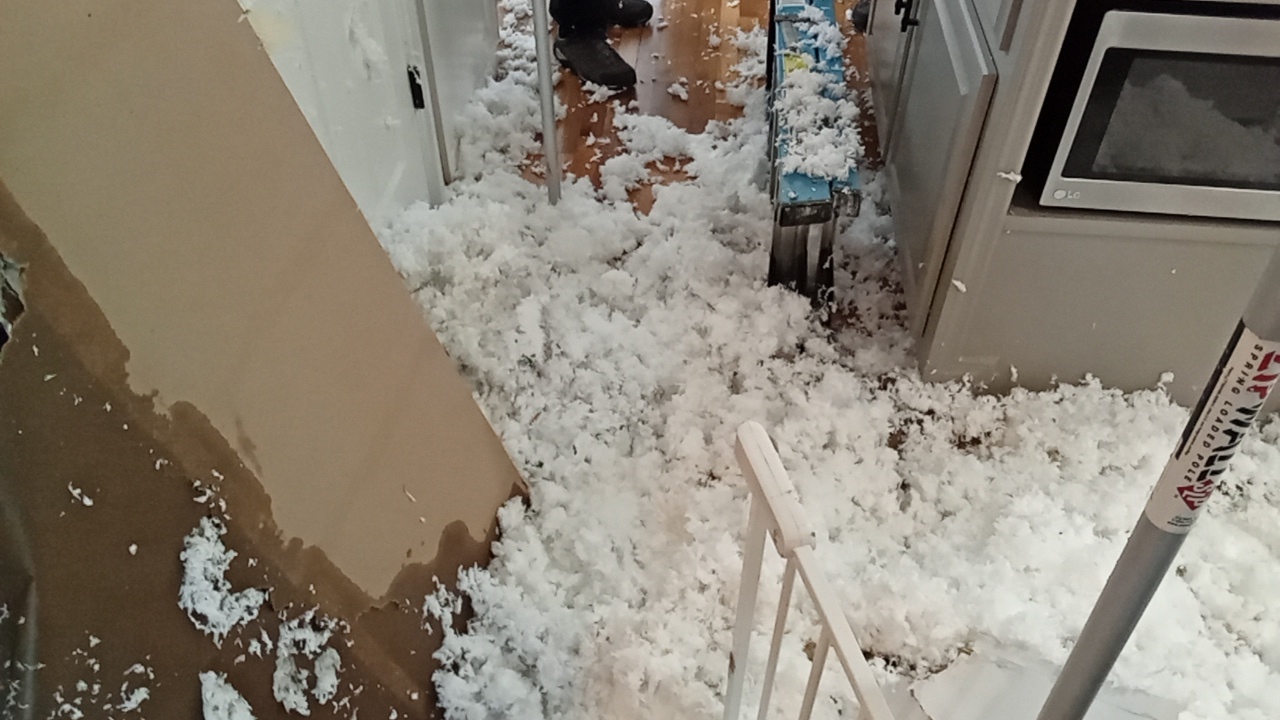Here in North Carolina, around Lexington and surrounding areas, it seems like every summer we get a period of extreme heat and moisture. With extreme heat, there is an increase in water damaged ceiling collapses. Recently, we were called into a home in Salisbury, NC and another in Winston Salem, NC where ceilings had collapsed. The cause for each was different.
For the water damaged ceiling collapse in Winston Salem, the home was newer, built in the 2000’s and the ceiling was constructed with one layer of drywall and had blown in insulation in the attic. The HVAC condensation drain had clogged or failed and water pooled in the attic, on the insulation and drywall creating weight which caused the ceiling to collapse in a hallway. Drywall fell in large chunks and blown-in insulation scattered.

Water Damaged Ceiling in Salisbury, NC
For the water damaged ceiling collapse in Salisbury, the home was older, built in the 1950’s and the ceiling was constructed with two layers of older drywall which was almost like a plaster. In this case, heat and moisture in the attic caused expansions and contractions of the ceiling. The plaster-like ceiling failed and the blown-in type insulation fell in the bedroom. The weight of the ceiling broke lamps and furniture as well.

When incidents like this occur, many homeowners first instinct is to have cleanup done immediately. While PuroClean specializes in emergency service, it is important to consider a couple of things first.
- Has the issue that caused the water damaged ceiling collapse been fixed and is it safe to work on? In the instance of the HVAC, has the condensation line been cleared or repaired which will stop any further damage and/or collapse?
- Is there should a concern for asbestos containing materials? Drywall, drywall compound, joint tape, textured ceilings, and insulation may contain asbestos and should be tested prior to cleanup to ensure there is no asbestos. If found, then a licensed asbestos abatement firm should be utilized for cleanup. Contrary to popular belief, asbestos is not currently banned (we still see it in some materials even in new homes built today) and it is a requirement of the EPA, OSHA and North Carolina Dept. of Health and Human Services to have it tested and abated properly.
- Is the home safe for the occupants to stay in or move around in? Can PuroClean setup containment and HEPA air scrubbers and isolate the room or area until proper testing and cleanup is available?
- What are the insurance considerations?
Unfortunately, situations like this can take time and be costly when cleaned up properly. Furniture can be lost or damaged, families can be displaced for a short period of time, carpet/pad may need to be replaced and repairs can take time and be costly.

It is important to have your HVAC system checked annually by a licensed HVAC professional. Ensure drains are clear and all components are functioning properly. Inspect your ceilings often. Look for signs of new or enlarging cracks. If you do notice them, call a contractor immediately. If the water damaged ceiling does collapse, work with a restoration professional like PuroClean Emergency Property Restoration here in Linwood, NC to guide you through the correct mitigation process.
Here at PuroClean, we understand that every water damaged ceiling disaster is unique. Dealing with these issues can be very stressful and draining on homeowners, and there are likely many questions that need answering. We pride ourselves on our empathy and compassion to help ease our clients through these difficult situations.
Chris Nowak is the owner of PuroClean Emergency Property Restoration (15 years) a Fire Fighter (19 years) and holds certifications as:
- – CIEC (Certified Indoor Environmental Consultant – ACAC cert # 2012031)
- – CMR (Certified Mold Remediator – ACAC cert # 1212007),
- – ASD (Applied Structural Drying) IICRC cert # 143641
- – CDS (Commercial Drying Specialist) IICRC cert # 143641
- – WRT (Water Restoration Technician) IICRC cert # 143641
- – TRST (Trauma Scene Restoration Technician) IICRC cert # 143641
- – FSRT (Fire & Smoke Restoration Technician) IICRC cert # 143641
- – NC Accredited Asbestos Inspector (HHCU cert #13243)
- – EPA Lead Renovator (HHCU cert # 170218)




 PuroClean Emergency Property Restoration
PuroClean Emergency Property Restoration